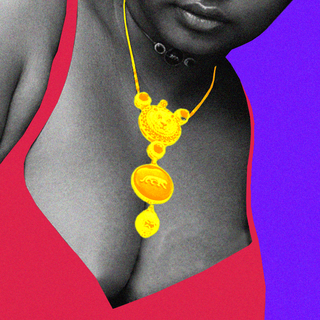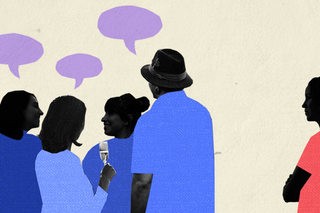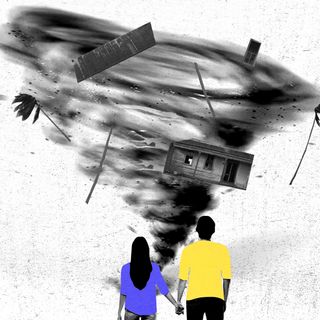
Why You Feel Like You Don’t Know How To Socialize Anymore
Long periods of isolation affect our social bonding hormones.

Three people walk into a park (with masks, of course). The first person looks around awkwardly. The second makes small talk about the changing weather. The third seems to have forgotten what to say to someone complaining about their love life. The emotional gymnastics repeat across social gatherings; people are baffled about the words, topic, emotions to offer to others.
Once upon a time, social life (or the choice to not have one) felt like an ordinary aspect of life. Now, in a world carrying the mark of the pandemic, socializing feels like a fossil. Lockdown, social distancing, and the havoc they wreaked on memory may have depleted social stamina, making people feel awkward and anxious. Researcher Catherine Loveday, a professor of cognitive neuroscience at the University of Westminster, called this “degraded social interaction.” “It’s not the same as natural social interaction that we would have,” she told The Guardian.
Chronic isolation of the pandemic is linked to a cognitive decline in general. At one level, it completely messes up memory. “From the minute we’re born – in fact, from before we’re born – when there is a new stimulus, a baby will turn its head towards it. And if as adults we are watching a boring lecture and someone walks into the room, it will stir our brain back into action,” author Moya Sorner explains in The Guardian.
Now imagine a scenario where there is no stimulus. Each day blending into the other — in the absence of commute, interaction, scenery — impacts the way the brain processes memories. The center of the brain (hippocampus) undertakes a process of “pattern separation”; that is, it encodes specific individual memories in a way there are no overlapping features and remain distinctive. But in the absence of new experiences, the confused sensation of not remembering things will continue. And sometimes, it may quite literally be hard to find the right words; the isolation may have also made us rusty in impacting our ability to recall words or things.
“For me, for 90% of the time now, I’m speaking only to my partner, in very familiar conversational patterns. I feel a bit shaky when it’s time to chat with a friend as if it requires dredging up a once-familiar language.” Moreover, the brain is shrinking due to chronic isolation — it will inevitably impact our ability to connect easily with other people. Previously, research has shown people with smaller social circles tend to have a smaller amygdala, the brain’s emotion-processing center.
Related on The Swaddle:
How Friendship Evolved Under Lockdown Amidst Cathartic Group Chats, Food Parcels
Also, think of socialization as a way to recharge our memories. When we repeat stories, the narratives help solidify our episodic memory of the event in itself. Telling someone about your dinner with a friend makes it easier to tell other people because you will remember it better. In the absence of social life, no wonder memories feel fuzzier.
Moreover, loneliness also plays with our hormone levels. A raft of studies draw a link between social distancing affecting people’s stress levels; even making them more vulnerable to depression. Researchers also note it can impact hormones that regulate social bonding; in that, some people be negative or paranoid depending on how their bodies process this period. “Overall, psychologists are seeing more adults report stress over social interactions, ranging from not knowing how to bookend interactions without a handshake or a hug, to running out of things to talk about,” BBC noted.
A more instinctive reason for our “de-socialization,” if I may, is the few stories we have amassed over the year. There are fewer parties, holidays are simpler, events scarcely dotted the calendar. With rants about work, burnout, and pandemic, there’s quite naturally little to talk about.
Things are much trickier for people with social anxiety. Researchers noted some may experience more hyperactivity, intolerance, irritability, and anxiety, among others. As the US National Social Anxiety Center advised, “keep in mind that every single one of us is now socially awkward to a certain extent.” The conversation of re-entering the social world must then be more inclusive, slow, and deliberate.
Roger Ho, a psychologist at the National University of Singapore, argues “masked socializing” is a good way to go about this scenario. Life with a “mask on” can gradually ease in people to a slightly changed world. “More public education in places where there is resistance to masks could help socializing this way feel less strange,” he told BBC.
The consensus then is: being around other people (safely) is likely to feel unnatural. But likely an atrophied muscle, our social skills may need some re-training. “Social skills are, after all, skills,” author Celeste Headlee tells NPR, explaining it only makes sense if they feel a little out of practice.
But, “you have 300,000 years of evolution helping you do this and helping you do it better than any species on the planet.”
Saumya Kalia is an Associate Editor at The Swaddle. Her journalism and writing explore issues of social justice, digital sub-cultures, media ecosystem, literature, and memory as they cut across socio-cultural periods. You can reach her at @Saumya_Kalia.
Related


Why Couples Tend to Grow Closer During Natural Disasters
